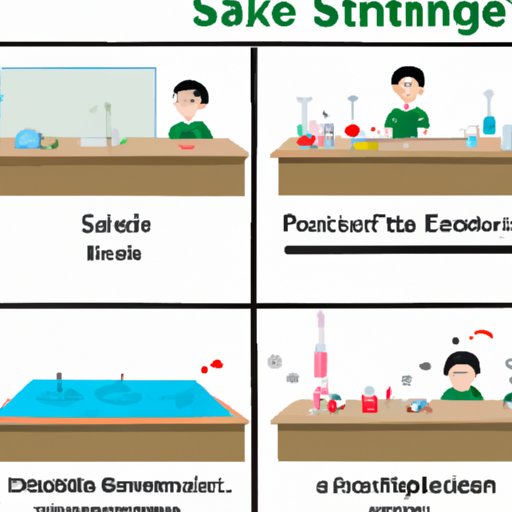Introduction
Science education in 3rd grade is an important step in developing a child’s understanding of the natural world around them. Through engaging activities and projects, students are introduced to the basic concepts and processes of science, while also developing their critical thinking skills. In this article, we will explore the building blocks of science that 3rd graders learn, investigate the topics they cover in life, earth and physical sciences, and discuss how they develop scientific thinking skills.

Exploring the Building Blocks of Science in the Third Grade
The first step in 3rd grade science education is introducing students to the basic concepts and processes of science. This includes teaching them about scientific observation, experimentation, and communication. Students learn how to make observations, form hypotheses, and design experiments to test their theories. They also learn about the importance of communicating their results to others.
In addition, 3rd graders learn about the different branches of science, such as life science, earth science, and physical science. This helps them understand how each branch contributes to our understanding of the natural world. They also learn about the scientific method and its importance in the pursuit of knowledge.
Finally, 3rd grade science education emphasizes the development of critical thinking skills. By learning how to ask questions, analyze data, and draw conclusions, students become better equipped to solve problems and think critically about the world around them.
Investigating Life, Earth, and Physical Sciences in the Third Grade
In 3rd grade science, students explore the three main branches of science: life science, earth science, and physical science. In life science, they learn about living things, their characteristics, and the environments they live in. For example, they might learn about the anatomy of plants or animals, the food web, and the impact humans have on the environment.
In earth science, students explore the planet we live on, including its structure, atmosphere, and climate. They learn about the different layers of the Earth, the water cycle, and the effects of weather and climate on the environment. They also learn about the formation and movement of rocks, soils, and land formations.
Finally, in physical science, students learn about matter, energy, and motion. They explore the properties of objects and substances, and learn how energy is transferred and transformed. They also learn about the forces of nature, such as gravity, and how they affect objects.
Engaging Students with Hands-on Experiments in 3rd Grade Science
One of the best ways to engage students in 3rd grade science is through hands-on experiments. Experiments allow students to explore scientific concepts in a tangible way, and help them develop critical thinking skills. For example, students might use experiments to test their hypotheses about the properties of different materials, or to observe changes in the environment.
Integrating experiments into the curriculum also helps students develop an appreciation for the scientific process. They learn how to plan an experiment, collect data, and draw conclusions from their results. This helps them understand how scientists use the scientific method to answer questions and solve problems.
Finally, hands-on experiments provide an opportunity to assess student understanding. Instructors can use experiments to evaluate student knowledge, identify areas where they need more support, and adjust their teaching strategies accordingly.
Developing Scientific Thinking Skills in 3rd Grade Science
In addition to introducing students to scientific concepts and processes, 3rd grade science education focuses on developing scientific thinking skills. Problem solving is an important part of this process, as it helps students understand how to approach and solve complex problems. Students learn how to break down problems into smaller parts, identify relevant information, and develop solutions.
Data analysis is another key component of scientific thinking. Students learn how to collect, organize, and interpret data. They also learn how to use graphs and charts to visualize data, and draw conclusions based on their findings.
Finally, 3rd grade science education helps students understand the importance of drawing valid conclusions. Students learn how to evaluate evidence and determine whether a conclusion is supported by the data. This helps them become better critical thinkers and problem solvers.

Connecting 3rd Grade Science to Everyday Life
By connecting 3rd grade science to everyday life, students are able to see how their knowledge can be applied in real world situations. For example, they might learn how the water cycle affects agriculture, or how the force of gravity affects the motion of objects. Through these connections, students gain a deeper understanding of how science affects the world around them.
Making connections between 3rd grade science and everyday life also helps students develop an appreciation for science. By seeing how their knowledge can be used in practical tasks, students become more motivated to learn and explore. This helps promote lifelong learning and a love of science.
Conclusion
3rd grade science education is an important milestone in a child’s development. Through engaging activities and projects, students are introduced to the basic concepts and processes of science, while also developing their critical thinking skills. They learn about the different branches of science, explore life, earth, and physical sciences, and engage in hands-on experiments. They also develop scientific thinking skills, such as problem solving and data analysis, and connect their knowledge to real world situations. By providing a comprehensive science education, 3rd grade teachers can help students develop a lifelong love of science.
(Note: Is this article not meeting your expectations? Do you have knowledge or insights to share? Unlock new opportunities and expand your reach by joining our authors team. Click Registration to join us and share your expertise with our readers.)
